A year ago on 6th May 2012 he won the battle for the Elysée. Ten years ago he became the unchallenged boss of the Socialist Party. And ever since François Hollande became president of France, the refrain from many socialists has been the same. “Hollande runs the country like he ran the party,” they sigh sadly. Indeed, the similarities between Hollande as head of state and Hollande as party boss are frequently invoked by party members in any analysis of the president’s first period in office.
At each abandoning of a policy, U-turn or delay; each time the Elysée makes clear its systematic refusal to fight an ideological battle; and each time the government considers that the main priority is to calm the situation, the allusion to the Socialist Party under Hollande's leadership is evoked once again. The same observation is routinely made: that when it comes to the Hollande style of exercising power, political adeptness simply turns into opposition to any change. One can even find clues in the way Hollande became the unchallenged head of the PS important to explain his apprehension about holding power - and the consequences of that unease.
As socialist boss Hollande had two distinct terms of office. The first was under the socialist prime minister Lionel Jospin – who was in office from 1997 to 2002 - when Hollande's job was as a conduit between the party and the head of the government. His performance then was much less criticised that is the case with the current party first secretary Harlem Désir, who finds himself in a broadly similar position under a socialist government. It was doubtless easier for Hollande to head a party that at that time had no significant internal opposition on the wider Left. There followed, it is true, the calamity of 21st April 2002 when Jospin failed to make it into the second round of the presidential election, having been beaten into third place by the then president of the far-right Front national Jean-Marie Le Pen. But the blame for that defeat was placed firmly on Jospin, not Hollande.
It was at the Dijon party congress in May 2003 that Hollande began his second term of office in which, after Jospin's defeat the year before, he was now in the front line as leader of the opposition. It was this congress, at which the socialists were supposed to learn the lessons of their candidate's elimination from the first round of the presidential election, which went on to constitute the 'original sin' of what might be termed 'Hollandisme'. It is as if the taking of power then at Dijon fixed a direction and style that Hollande is now paying the price for at the Elysée; being stuck in an ivory tower, impervious to social movements, just as the PS leadership was when he was in charge.
What follows is an analysis of the seven symptoms – seven as in the number of deadly sins – of what can be called the 'Dijon syndrome' which forms the basis of Hollande's approach to power today.
Putting up with democratic shortcomings
In common with the late socialist president François Mitterrand, Hollande put up with the Socialist Party's restlessness and the abuses of its power brokers when he was its boss. Mediapart interviewed Hollande on 12th April 2012 before the presidential election, and while he did not dodge the criticism about inaction over the rigged votes alleged to have taken place in some regional party federations, they did not seem to concern him unduly. Indeed, after the broadcast he even confided with a smile: “Mitterrand also cheated at Épinay, in relying on the large federations”, referring to the party congress in 1971 in which Mitterrand took control of the Socialist Party which had emerged from the ruins of the old French Section of the Workers' International (SFIO).
Working alongside Hollande at the Dijon congress one finds the same figures who went on to accompany him at the head of the PS and who have all now become ministers or who occupy key positions in institutions: François Rebsamen, who is now president of the socialist group in the Senate, agriculture minister Stéphane Le Foll, defence minister Jean-Yves Le Drian, Bruno Le Roux, who is president of the socialist group at the National Assembly, war veterans minister Kader Arif and employment minister Michel Sapin. The opposition to Hollande at the congress was divided and obtained around 40% of the vote; though there are many who still insist to this day that the vote was rigged.
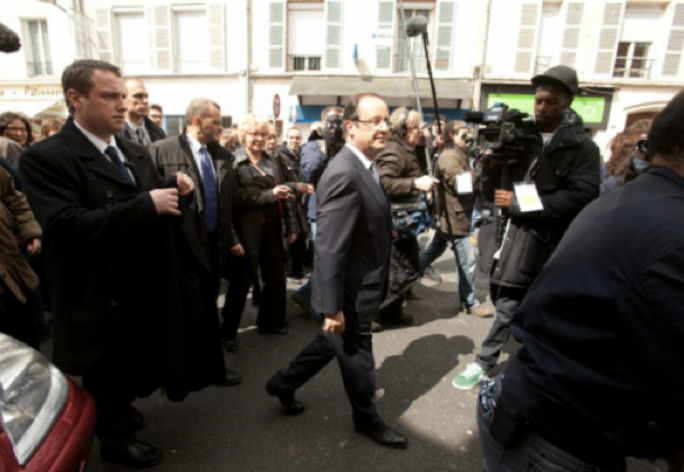
Rewarding bad practices
At the Dijon congress Hollande relied on the three powerful local federations of Bouches-du-Rhône and the Hérault in the south of France and the Pas-de-Calais in the north-west, who between them at the time contained 30% of party members. They voted to order, that is to say they rigged the votes. Hollande scored between 80% and 90% in these three départements (broadly equivalent to counties). Meanwhile the votes in the other federations were much closer, and in some cases went against Hollande. The kind of block voting that had helped Mitterrand back in 1971 at Épinay was back.
Therefore these three fiefdoms were later granted absolute autonomy which, with the party under Hollande not taking any action, would result in clientelism and anti-democratic abuses. Under the subsequent party leadership of Martine Aubry from 2008 to 2012 these federations were sometimes subject to central party supervision. And legal prosecutions began, targeting three of the most ardent Hollande supporters in this period: Jean-Pierre Kucheida, Jean-Noël Guérini and Robert Navarro (an aide of the late and controversial Georges Frêche, who was often suspended under Hollande's leadership but only expelled under Aubry).
It is instructive to hear Hollande respond to reporter Fabrice Arfi's questions on the subject in Mediapart's broadcast during the presidential campaign. On each occasion it is the same assessment; he was not aware of it and was never directly involved. The party's first secretary at the time was guilty of letting things carry on, playing for time, content to make clear that he trusted the word of his friends, and not taking a decision despite many warning signs. Ultimately it is now down to the justice system to look into the abuses that he tolerated. Any resemblance to a recent case – for example the Jérôme Cahuzac affair (1) – is of course coincidental...
Accepting regional socialism
As a corollary of his reliance upon the local regional party chiefs or 'barons', Hollande developed a regional vision of politics after the Dijon congress in which high-profile local elected officials were held up as an example of governance. “We have the good fortune in the Socialist Party to have these elected officials. I will even say that we don't yet have enough of them,” Hollande said from the congress podium. And the actions of regional party barons such as the mayor of Lyon in the east of France Gérard Collomb, Dijon mayor François Rebsamen, Jean-Yves Le Drian, president of the Brittany region in the west or France or the president of the Aquitaine region of south-west France Alain Rousset were often cited during the Hollande era. Indeed, if there was one tangible success during Hollande's time as head of the PS it was the party's victories in local, regional and cantonal elections. Between 2004 and 2008 the regions of France became almost entirely under socialist control, culminating in the party taking control of France's second chamber the Senate in 2011. Here another Hollande ally Jean-Pierre Bel took over its presidency.
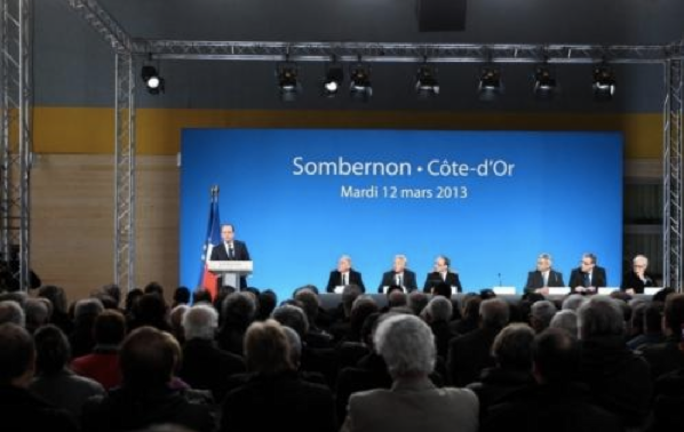
Hollande declared his candidacy for the presidential elections from the central France town of Tulle in the département of the Corrèze where he was then mayor. During the election campaign itself Hollande constantly held up the Corrèze – where he was also president of the département council - as an example. And once elected as head of state, Hollande went to the rural town of Sombernon in east France in March to make an impassioned speech about rural affairs. Just as at the many local party gatherings that he attended when leading the PS, here was President Hollande praising the beauty of a local area, in this case the Auxois-Morvan countryside. “Rurality is at the same time our history and our future,” said Hollande. “It's our history because it's in rural areas that France was created with its agriculture, its production, its landscapes, its traditions. But rurality is also a measure of confidence in the future because it is in the rural areas that we can find the levers for our own development.”
François Hollande has recently been criticised in his own party ranks – and notably by socialist MP Pascal Cherki – for behaving as president as if he were head of a “département council”. As boss of the PS Hollande indeed constantly argued that the way in which the party ruled at local level should influence the way the French state itself is run. It was under him that the idea of a “socialism of the local regions” was born, a model of governance and cooperation between states and local authorities in which there is a constant dialogue with local elected officials and in which, above all, priority is given to compromise.
It is this desire for compromise that has led Hollande to defer plans for a new phase of planned decentralisation – following major reforms in 1982 and 2002 – that had been greeted with a mixed reaction. For fear of upsetting certain powerful elected officials the president will tackle the complex, multi-layered French system of local government by adding another tier, metropolitan authorities, and changing voting methods. Decisions on other changes will be postponed for another day.
-----------------------------------
1. The former budget minister who in April finally admitted that he did have an undeclared overseas bank account after months of denials. It has been claimed that President Hollande was alerted soon after Mediapart originally broke the story in December 2012 that Cahuzac probably did have a Swiss bank account, despite the minister's protestations of innocence. Find Mediapart's coverage of the affair here.
The sidelining of a political generation
François Hollande won at the Dijon congress in the face of opposition from the left of the party and from modernisers. The party boss then opted to sideline a generation of 30 and 40-year-old politicians; Vincent Peillon, Benoît Hamon and Arnaud Montebourg and the entire left wing who came from the students' union the Union Nationale des Étudiants de France (UNEF) and the former Gauche socialiste section of the party who were lined up behind Henri Emmanuelli and Jean-Luc Mélenchon.
For Hollande there was no question at this time of adopting some of their thinking or giving into the 'whims' of the Nouveau Parti socialiste – a left-wing caucus within the PS – about elected officials not being able to hold two posts at the same time nor the 'archaic' obsessions of the left wing and its criticisms of economic liberalism. Nor was there any question of Hollande compromising with this internal opposition over misgivings they had over the direction of the European Union.
And yet from the podium at the Dijon congress, showing a good knowledge of his party's history, he made a left-leaning speech. “We have even shown such a taste for governing that, often, we have succumbed a little to the temptation of thinking we win over our opponents by being more orthodox than them. I don't think that this is necessary,” said Hollande. Yet behind the scenes he was forging an alliance with supporters of Dominique Strauss-Kahn and Laurent Fabius. Both camps had been formed with the 2007 presidential election in mind, and both were convinced of the need for French socialism to adopt a more liberal stance in economic matters.
When Mediapart asked Hollande about this episode in 2008, he did not baulk. “I did not want our political line to be based on the personalities who supported it but on the coherence and constancy of our positions,” he said. “Once the reformers had launched into a fight for a parliamentary Sixth Republic and against European institutions, and had criticised the economic policy we had followed, it was not possible to bring together such irreconcilable interests.
“I did not question their desire for reform and I found it regrettable that this generation could not fulfil its full potential. So I found myself with Dominique Strauss-Kahn and Laurent Fabius and many others without having sought it or regretted it, less because I had sought them out than because they were there at that time, on the same line as I was.”
When Hollande became president, his adversaries over the previous decade were nevertheless given ministries. But even if those who advocated reform at Dijon, such as Montebourg and Peillon, have been brought back into the fold – Peillon as education minister and Montebourg as minister for productive recovery - they are not exactly cosseted by the executive, but rather left to face their difficulties alone. As for the left wing of the party, it obtained only a junior minister in Hollande's government in the form of Benoît Hamon, minister for the social economy.
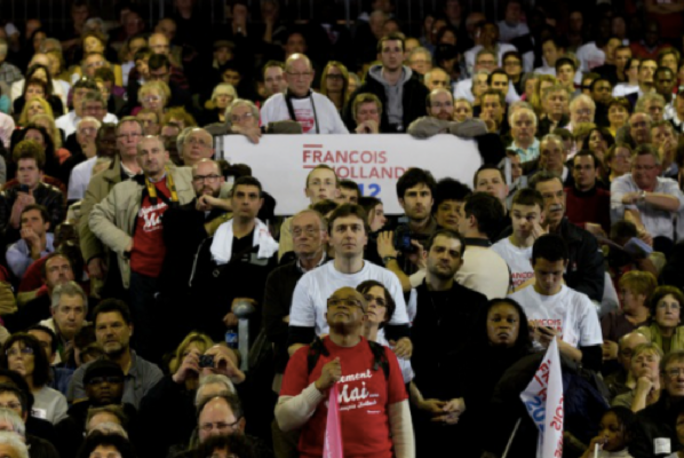
Putting reform on the back burner
Reform was promised in Hollande's speech at Dijon, but even then it seemed no more than a hollow slogan that left little room for political innovation. Diversity and parity were given the nod, even though the party’s own internal structures no longer had any semblance of parity in their ranks.
Five people were promoted to the national council who, according to Hollande at the time, represented "all the colours of our party". But apart from this, the socialists' racial, sexual and social diversity had worn so thin that when Nicolas Sarkozy became president in 2007 and appointed three ethnic minority women, Rachida Dati, Rama Yade and Fadela Amara, as ministers, he put the Socialist Party in the shade.
One irony of this story is that Amara, who co-founded Ni Putes Ni Soumises, an organisation helping women chiefly from North African communities to defend their rights, had been one of the few people from an immigrant background to have been promoted to the level of national secretary in Hollande's Socialist Party. And even now, although there is parity in the current government, the most important jobs have been given to white men, with the notable exception of Christiane Taubira, the Justice Minister, who hails from the French Caribbean.
Reform à la Hollande as set out at Dijon entailed referendums of party members, and one of these had already been announced at the conference, a vote on the proposed European constitution. But after card-carrying socialists had backed the constitution in December 2004 – a vote marred by irregularities but nevertheless the vote was 59% in favour – the national referendum in 2005 came out against it, including a 55% no-vote from supporters of the Left.
That seemed to deal a death blow to Hollande's enthusiasm for referendums. Although he promised to hold one on the reform of the French Republic’s institutions for the first half of his presidential mandate, the idea seems to have been mothballed. Any attempt to bring up the subject, even by the Socialist Party's top ranks, meets with a deft backhander from the Elysée Palace.
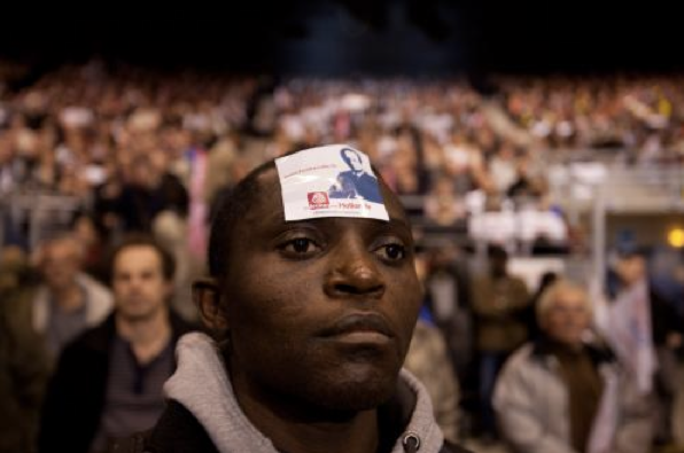
As for the idea of holding primaries to choose the PS's candidate for the presidential election, put in place for the first time in 2011, Hollande did not even mention it at Dijon. It was inconceivable for him if it were to involve a wider electorate than the party's inner circle, principally composed of parliamentarians, their advisers and municipal employees. Why take the risk of holding uncontrollable elections? He only espoused the idea of a primary open to all when he was no longer running the party.
When it came to the date chosen for the party primary election ahead of the 2012 presidential election – the autumn of 2011 - Hollande said it fell too late in the run-up to the presidential election but the party leadership opposed him. In the end the timing worked in Hollande's favour, as he was able to reap the benefit of Dominique Strauss-Kahn's disgrace, which had left the party without the candidate everyone had assumed would be able to beat Nicolas Sarkozy.
Hollande acknowledged as much, saying in an aside to journalists just before the first round of the presidential election last year: “What still amuses me is that if my comrades had listened to me, I would not have been chosen. I was against the primaries and against the timing.”
The end of the broad Left
Hollande's analysis at Dijon of the Socialist Party's débâcle on April 21st 2002, when the left-wing vote was split, was that “our problem last year was not our dominance, but above all our weakness which made us unfit to be in the second round of the presidential election”.
During the period following the broad-left coalition government of 1997 to 2002, the Socialist Party's relationship with its old Green Party partners grew increasingly strained at each local election, and electoral agreements were mostly reduced to a minimum. Relations with the French Communist Party meanwhile deteriorated in tandem with Socialist victories in Communist bastions. The Socialist Party under Hollande basically backed production-oriented economic policies and the market economy, and divergences from these points were never debated with the party's partners, who had gradually become competitors.
As Hollande's mandate at the PS's headquarters drew to a close, the “great Socialist Party” he had called for at Dijon was nowhere to be seen. The party had not doubled its membership as promised, and the creation of a 20-euro membership was not exactly a model for integrating new blood. A new environmental alliance Europe Écologie – Les Verts even challenged the party's leadership of the Left in the European elections in 2009.
A further blow came with the departure of Jean-Luc Mélenchon, who had tired of Hollande's centralising orientation which he believed was irreversible. This reduced the Socialist Party's ideological breadth and opened the way for the arrival of another significant force to contest it, Mélenchon's radical left Front de Gauche. Hollande had wanted the Socialist Party to be more dominant on the Left, and now he has to reap the whirlwind that he sowed, as well as dealing with his own camp, which has rarely been so divided when in power.
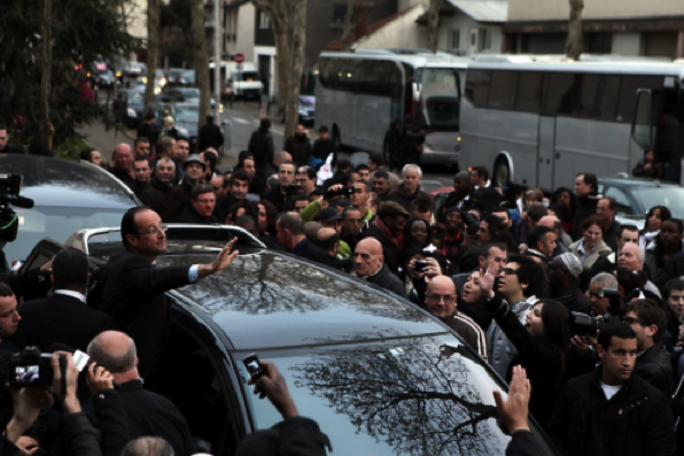
Left-wing rhetoric but disgruntled working class supporters
At the time, the Dijon conference was seen as symbolising the Socialist Party's return to its roots on the Left. In a period when a highly controversial pension reform was being proposed by the government, the moderate leader of the CFDT trade union at the time, François Chérèque, preferred negotiating with centre-right prime minister Jean-Pierre Raffarin to attending the PS congress that year. In contrast the leader of the militant CGT, Bernard Thibault did go to Dijon and was given a standing ovation.
Without notifying backers of other congress policy motions, Hollande even added the policy of giving the right to a full pension at the age of 60 into the text at the last minute. It was the last time a PS conference voted on the issue of pensions, and the vote was unanimous. With hindsight, Hollande's speech then was a precursor of his keynote and acclaimed election speech at Le Bourget in January last year, in the sense that it lulled a socialist audience into the illusion that they were hearing a clear position opposing pension reform.
"The government's plans call for a major refusal from socialists,” Hollande said at Dijon, adding that he opposed “a philosophy that asks employees to work for longer and earn less”. He objected to “lengthening the period of paying pension contributions to 40, 41, 42 years or more”, yet once he became president, this longer period for contributions was enacted; and more is yet to come. The announcement that the government is planning further pension reform suggests the approaching culmination of the betrayal of Dijon.
After the Dijon gathering Hollande gradually moved further away from the trade unions and social movements, and the Socialist Party moved with him. And during a demonstration defending public services in Guéret, central France, on March 5th 2005, snowballs were thrown at Hollande. The projectiles came from the ranks of trade unionists and backers of a 'no' vote in the European referendum.
Since the referendum, on May 29th that year, the Socialist Party has not taken to the streets. Only the Young Socialists can be seen on demonstrations nowadays, and they get a mixed reception. And when Hollande left the top job, the Socialist Party was no longer even a signatory backing the NGOs the Ligue des Droits de l’Homme ('French Human Rights League') or the Réseau Éducation sans Frontières ('Education without Borders').
From Dijon 2003 to Dijon 2013: 'Where are your promises now?'
When Hollande was party leader he was well liked by activists, but mostly for his humour and rarely for his landmark speeches. He was, on the other hand, constantly challenged, even mistrusted, by the rest of the party hierarchy – head-on by the left wing and then supporters of Laurent Fabius, and more covertly by followers of Strauss-Kahn. His authority was never recognised by party leaders, but he benefited from his ability to unite, which he used to its fullest extent at the conference at Le Mans in 2005 to heal a party divided by the European referendum.
When Hollande left the party's top job in 2008, he did not try and remain neutral. He backed Paris mayor Bertrand Delanoë, who was the favourite to succeed him and was seen as continuing Hollande's own line of social democracy veering towards neo-liberalism. However, at the party's key congress at Reims in November 2008 Delanoë's policy manifesto motion got fewer votes than that of Ségolène Royal, drew more or less level with Martine Aubry and was not far ahead of the left-wing motion put forward by Benoît Hamon. It was hardly a sign of support, especially in the wake of a conference where the party leadership stressed the need to “get the party back to work”, a clear implication that it had not been working under Hollande.
Since then the former first secretary has no longer enjoyed majority support in his own party, even since becoming president. He managed to earn the epithet of “alchemist” from sympathisers, meaning that having managed to don the mantle of being the “normal candidate”, opinion polls showed him as being the most able to defeat the hyper-president Sarkozy. But since achieving this, he has been unable to impose someone close to him at the helm of the party.
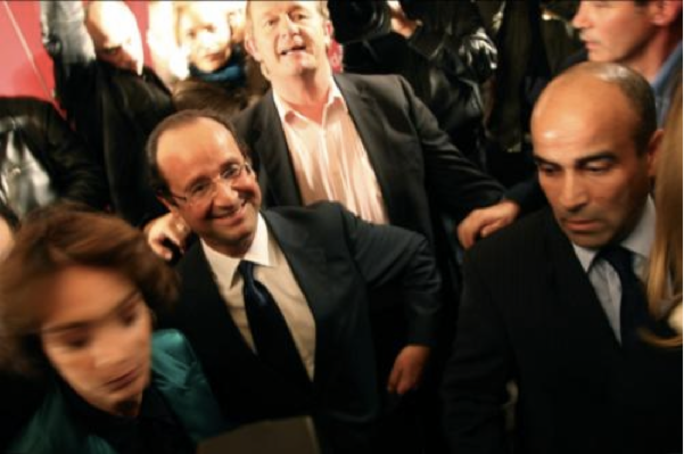
Enlargement : Illustration 9

To celebrate Hollande's first year in power, the Socialist Party decided to go on the offensive against German Chancellor Angela Merkel's European policies. The executive immediately whipped it back into line. Yet the party's European policy has to be backed by the membership, and many people at party headquarters are wondering how this scrap will turn out.
Up to now, every time the party has tried to challenge its former first secretary's tendency to prevaricate, whether on the issue of parliamentarians not being allowed to double up on local and national government responsibilities, giving foreigners the right to vote, or calling a referendum on morality in politics as on the European question, Hollande has chosen to bury each issue. In another example, although striking workers at PSA Peugeot Citroën's Aulnay factory were applauded at the Socialist Party's national council in April, two weeks later Hollande decided to oppose an amnesty for trade unionists, a move that provoked incomprehension and bitterness.
At the 2003 Dijon conference Hollande spoke of some of the problems and criticisms traditionally faced by socialists when they get into power. “...right away, [an] indictment begins, that of bad conscience, treason, denial, abandonment, as if taking power is necessarily a bad compromise and always ends in the same way, with capitulation,” he said. “Because now, we are told, capitalism has become too strong and social democracy too weak. As if the system would devour us, as if it were possible, from the start, to put oneself right outside the system.”
Seeking to give his presidency new momentum, Hollande launched a communications campaign in March. He spent two days meeting the French public in the provinces – including Dijon. The event most people are likely to remember from those two days is when a trade unionist got frogmarched out of a meeting for having asked Hollande: “Where are your promises now?”
------------------------------------------
English version by Sue Landau and Michael Streeter


